
"Mr. Sandman" is a popular song written by Pat Ballard and published in 1954. It was first recorded in May of that year by Vaughn Monroe & His Orchestra and later that year by the Chordettes and the Four Aces. The song's lyrics convey a request to "Mr. Sandman" to "bring me a dream" – the traditional association of the folkloric figure. The pronoun used to refer to the desired dream is often changed depending on the sex of the singer or group performing the song, as the original sheet music publication, which includes male and female versions of the lyrics, intended.
"I Don't See Me in Your Eyes Anymore" is a popular song, written by Bennie Benjamin and George David Weiss and published in 1949. The song was popularized that year by Gordon Jenkins and His Orchestra and by Perry Como.
"Tammy" is a popular song with music by Jay Livingston and lyrics by Ray Evans. It was published in 1957 and made its debut in the film Tammy and the Bachelor. It was nominated for the 1957 Oscar for Best Original Song. "Tammy" is heard in the film in two versions. The one that became a number one hit single for Debbie Reynolds in 1957 is heard midway through the film, and was a UK No. 2 hit single in the same year. Another version was heard during the main titles at the beginning of the film and was a hit for the Ames Brothers. There have been several other cover versions of the song.
"April in Portugal" is a popular song, also named "The Whisp'ring Serenade." The music was written by Raul Ferrão with Portuguese lyrics by José Galhardo as a fado named "Coimbra", about the city of that name in 1947. English lyrics written by Jimmy Kennedy were set to the music, though many of the most popular versions of the song were instrumentals. It is one of the signature songs of Portuguese singer and fadista Amália Rodrigues. It was also recorded in French by the tenor Luís Piçarra.
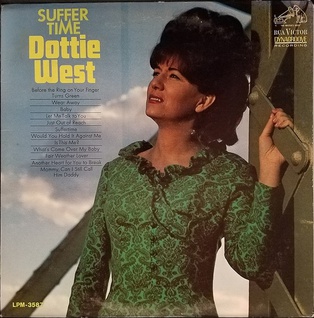
Suffer Time is a studio album by American country music artist Dottie West. It was released in July 1966 on RCA Victor Records and was produced by Chet Atkins. It was West's third studio album as a music artist and was her first concept album in her career. The record's concept focused on themes related to heartbreak and lost love. It included new compositions and cover versions of other recordings. These recordings included four singles, including the top ten hit "Would You Hold It Against Me". Suffer Time would become one of West's most successful and highest-selling albums in her career.

With All My Heart and Soul is a studio album by American country music artist Dottie West. It was released in January 1967 on RCA Victor Records and was produced by Chet Atkins. It was West's fourth studio album as a recording artist after having her first major hit in 1964. The album included 12 tracks, including the single "Paper Mansions". The song became a top ten hit on the Billboard country chart following its release. The album itself would also chart on a similar Billboard country albums survey.

Here Comes My Baby is a studio album by American country music artist Dottie West. It was released in June 1965 on RCA Victor Records and was produced by Chet Atkins. It was West's debut studio album as a recording artist and was issued following the success of the title track in 1964. The latter song won a Grammy Award in early 1965 which prompted the issue of the album. Here Comes My Baby would start a series of studio recordings West would release for RCA.

I'll Help You Forget Her is a studio album by American country music artist Dottie West. It was released in November 1967 on RCA Victor and was produced by Chet Atkins. West's seventh studio effort, I'll Help You Forget Her was also her fourth studio offering in 1967. It included the single "Like a Fool", which became a major hit. The album itself would reach peak positions on national publication charts.

Country Girl is a studio album by American country music artist Dottie West. It was released in August 1968 on RCA Victor Records and was produced by Chet Atkins. The project was West's ninth studio album and second to be released in 1968. The album consisted of 12 tracks, which contained new recordings and cover versions. The album's title track became a major hit in 1968 and would later be a signature song for West.
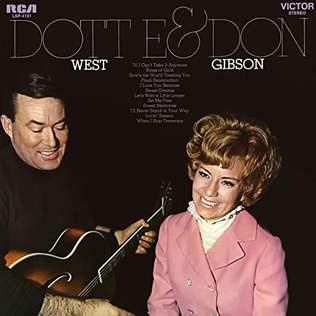
Dottie and Don is a studio album by American country music artists Don Gibson and Dottie West. It was released in March 1969 on RCA Victor Records and was produced by Chet Atkins and Danny Davis. The album was a collection of duet recordings between Gibson and West. It was both artists first album of duets to be recorded. Among the songs from the project, "Rings of Gold" became a major hit in 1969.
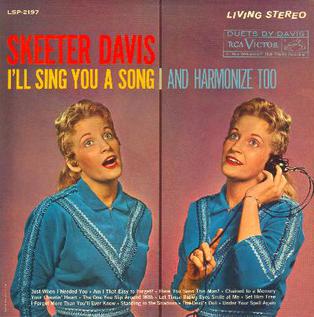
I'll Sing You a Song and Harmonize Too is the debut studio album by American country artist Skeeter Davis. The album was released in November 1959 by RCA Victor and was produced by Chet Atkins. It signified Davis' first solo album ever released after departing from the duo, The Davis Sisters.
"Do I Ever Cross Your Mind" is a song by American singer-songwriter Dolly Parton. The song was written by Parton and was first released as a duet with Chet Atkins on his 1976 album, The Best of Chet Atkins & Friends. Parton performed the song live throughout the 1970s, but did not release a solo version until 1982 on Heartbreak Express. Parton's solo version was released as the album's third single in July 1982, a double A-side release with "I Will Always Love You" from The Best Little Whorehouse in Texas soundtrack. The song did not chart on its own, but did chart as the flip-side of "I Will Always Love You" throughout the single's chart run on the Billboard Hot Country Songs chart. Parton would record the song for a third time in 1994, this time with Emmylou Harris and Linda Ronstadt. This version would be released on the 1999 album Trio II, and would be one of three singles released simultaneously from the album.

Foreign Love is a studio album by American country singer-songwriter Hank Locklin. It was released in January 1958 via RCA Victor Records and was produced by Chet Atkins. It was the Locklin's debut studio album in his recording career. It was also a concept album that focused around the theme of love overseas. The album would be one of many Locklin concept records issued by RCA Victor until 1972. Foreign Love featured his major hit from 1957, "Geisha Girl." It was received favorably by critics in years following its release.

Happy Journey is a studio album by American country singer–songwriter Hank Locklin. It was released in January 1962 via RCA Victor Records and was produced by Chet Atkins. Happy Journey was Locklin's third studio album released in his recording career. It contained a total of 12 tracks, three of which were hits on the country chart: "You're the Reason," "Happy Birthday to Me" and the title track. It included a combination of new recordings and cover versions of songs previously recorded by other artists.
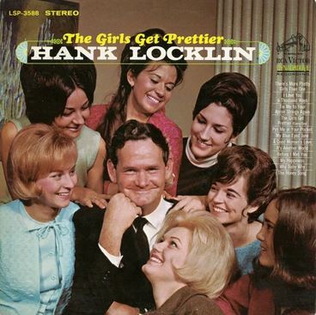
The Girls Get Prettier is a studio album by American country singer–songwriter Hank Locklin. It was released in May 1966 via RCA Victor Records and was produced by Chet Atkins. It was Locklin's thirteenth studio recording in his music career and contained two singles, one of which became a top forty hit in 1966. The album consisted of 12 tracks and received mixed reviews from music publications.
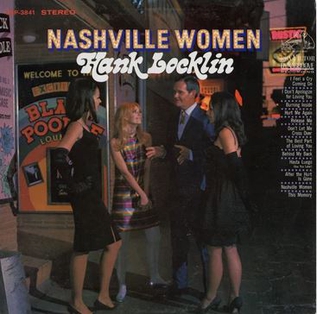
Nashville Women is a studio album by American country singer–songwriter Hank Locklin. It was released in August 1967 via RCA Victor Records and was produced by Chet Atkins. Nashville Women was Locklin's sixteenth studio recording and contained 12 tracks. Three of the album's tracks were singles that became minor hits on the country chart in 1967. The album itself would also chart following its release. Nashville Women would receive positive reviews from critics and music publications.

Country Hall of Fame is a studio album by American country singer–songwriter Hank Locklin. It was released in February 1968 via RCA Victor Records and contained 12 tracks. The album was co-produced by Chet Atkins and Felton Jarvis. The album's name was derived from its single of the same, which became Locklin's first major hit in several years. It would also be his seventeenth studio recording released in his career and one of many to be produced by Chet Atkins. Country Hall of Fame received positive reviews from writers and publications.

My Love Song for You is a studio album by American country singer–songwriter Hank Locklin. It was released in August 1968 via RCA Victor Records and contained 12 tracks. It was co-produced by Chet Atkins and Danny Davis. My Love Song for You was Locklin's eighteenth studio album released in his career and his second album to be released in 1968. The record included two singles, which became charting singles on the Billboard country chart. The album itself would also chart and receive positive reviews from music publications.
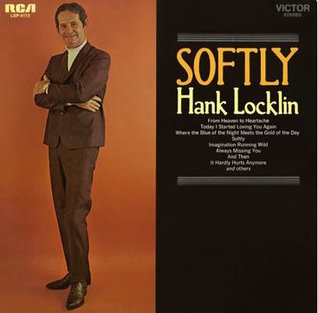
Softly is a studio album by American country singer–songwriter Hank Locklin. It was released in December 1968 via RCA Victor Records and contained 11 tracks. The album was co-produced by Chet Atkins and Danny Davis. Softly was Locklin's nineteenth studio album released in his career and third to be released in 1968. It contained one single, "Where the Blue of the Night Meets the Gold of the Day." The song became a charting single in 1969. The album itself would also reach a charting position following its original release.

The Mayor of McLellan, Florida is a studio album by American country music singer–songwriter Hank Locklin. It was released in November 1972 via RCA Victor Records. Consisting of ten tracks, the album was co-produced by Chet Atkins, Jerry Bradley, Danny Davis and Ronny Light. It was Locklin's final studio release for the RCA Victor label and contained among his final single releases.
















